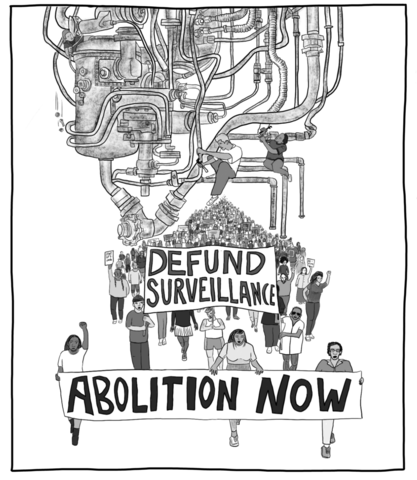Criminalization, a centuries-old project of white supremacist, capitalist statehood, continues to animate the apparatus of mass incarceration that structures and normalizes US social and economic life in ways that are fundamentally antiblack and xenophobic. In every era, criminalizing discourses have made use of pseudoscientific concepts that are supposedly backed by data in order to justify dehumanization, collective punishment, social control and biometric registration of individuals and groups that are targeted by the state. In this tradition, concepts like “mental degeneracy,” “loose family morals,”Note en bas de page 1 “criminal,” and “high-risk,” are deployed.
As of January 2022, many of the systems and processes described in this report still rely on real-world occurrences to trigger criminalization — an arrest, a conviction, a border-crossing. In the language of the surveillance state, these are “events.” Processes of criminalization that rely on these occurrences can be described as “event-triggered” data criminalization.
But event-triggered data criminalization is limiting for authorities. If the underlying real-world occurrences, or “events,” don’t happen — if the person ICE wants to deport isn’t arrested by local cops, for example — then that person may remain under the radar, out of scope at least partially and temporarily from the extensive machinery of migrant data criminalization.
DHS is actively trying to overcome the limits of event-based criminalization by supplementing it with further-reaching methods. We are now subject to two (sometimes overlapping) types of criminalization: event-triggered data criminalization and automated, continuous data criminalization.
DHS is actively trying to overcome the limits of event-based criminalization by supplementing it with further-reaching methods. We are now subject to two (sometimes overlapping) types of criminalization: event-triggered data criminalization and automated, continuous data criminalization.
Examples of event-triggered data criminalization include:
- A police officer arrests you for a DUI and books you.
- ICE raids your workplace, and you get swept up as “collateral.”
- Border Patrol stops your car at a checkpoint and makes a note in a computer that will stay on your permanent record, which may be retrieved when you apply for a type of status or benefit, or cross the border, in the future.
- Your passport is scanned at an airport before you board an international flight.
- Video footage of you walking through an airport is matched, via facial recognition software, to previous travel documents that indicate to DHS that you may have overstayed a visa.
Examples of automated, continuous data criminalization include:
- A contract analyst for DHS runs an algorithm that determines that you are “high risk” for violating US laws, and makes a notation that ensures that if you ever attempt to enter the US, a CBP officer will put you in secondary inspection to interrogate you and determine whether you can be turned back as “inadmissible” to the US.
- In conducting (manual or automated) reviews of its own records, the Department of State adds you to a list of politically active Iranians who have come to the US on temporary visas before, for whom it will deny future visa applications based on nationality and political activity.
- You appear in photos posted on Facebook by other people who are already listed as gang members in a gang database. Facial recognition matches you to a past entry into the US, using databases that store facial scans from entry and exit points. You are flagged as a potential gang member based on the association with suspected gang members, triggering ICE or HSI investigation and possible arrest.
- The information captured by your smartphone — location data, biometrics, shopping history, Internet searches — is aggregated and resold by data brokers to DHS agencies who run that data through algorithms to determine if you seem likely to be: a terrorist, an absconder, a criminal.
Automated, continuous data criminalization compounds the harms of the event-triggered model, and dramatically expands its reach. Event-triggered data criminalization operate like a series of traps in a field: some are known and squarely located on enemy terrain, such as a police station where we are booked; other traps are hidden in places that seem neutral or even safe: DMVs that allow DHS to digest our photos with its facial recognition software, utility companies that sell our home addresses, or social media venues used by ICE agents to stalk us.
Automated, continuous data criminalization endeavors to create a regime where every part of the field is surveilled and subject to control at all times, using data from an unknowable number of sources.
Automated, continuous data criminalization endeavors to create a regime where every part of the field is surveilled and subject to control at all times, using data from an unknowable number of sources. In addition to expansion and intensification, another consequence of automated, continuous data criminalization is that the act of real-time, population-level surveillance creates new reasons to justify criminalization by algorithmically determining who is a “risk,” and what technique of criminalization to use in response to that risk. Using this circular logic, insights from the algorithm become the “derogatory” information used to justify arrest, incarceration, banishment, or exclusion. The full repercussions of the move to this model are far from clear from our current vantage point, shrouded as its techniques remain in secrecy.
Data liberation and abolition
Increasingly popular technocratic tools, such as predictive algorithms, relationship-mapping and data-indexing software systems allow for the formal, extra-legal automation of data criminalization. That automation is engineered to determine that a person who was criminalized in the past or present should continue to be criminalized in the future. Since having criminal history data is the material outcome of decades of racist policing and mass incarceration policies, data criminalization risk-prediction allows current and future arrests to resurrect and wield the full weight of that history, all while using abstracted and sanitized data.
As noted throughout this report, criminal history datasets are riddled with flaws and are incomplete. Many key criminalizing metrics — such as “failure to appear in court” — are themselves arbitrary constructs that reflect power relations (as is all behavior that is deemed criminal), have no common definition, and are at best inconsistently recorded. Yet, prediction processes make use of these data to deny or limit a person’s freedom. That is social control.
As corporations and governments become increasingly enamored with AI prediction tools, and biometric and real-time mass surveillance becomes yet more automated, frictionless and ubiquitous, we expect to see data criminalization strategies currently used for immigrant and traveler surveillance creep further into currently non-criminalized spaces, expanding the pools of whom is subject to surveillance and control.
We conclude where we began: Surveillance is not passive; it is active intervention in the form of behavior prediction for modification; it is real-time social control. Data criminalization, an expression of surveillance, is created by legal and extra-legal methods that create criminalization and other forms of vulnerability, social exclusion and social death. Currently, as sophisticated as tech tools are, they rely on legacy criminal legal datasets that reveal the illegitimate and racist nature of criminalization. Privacy is an insufficient framework to combat either surveillance capitalism or data criminalization, because surveillance technologies are largely unregulated and misunderstood, corporations are not subject to meaningful privacy laws, and people who are criminalized are dehumanized, often required to “consent” to surveillance in order to access resources for survival, and generally seen as undeserving of privacy under the law.
Privacy is an insufficient framework to combat either surveillance capitalism or data criminalization, because surveillance technologies are largely unregulated and misunderstood, corporations are not subject to meaningful privacy laws, and people who are criminalized are dehumanized, often required to “consent” to surveillance in order to access resources for survival, and generally seen as undeserving of privacy under the law.
We must be ready to fight data criminalization on our terms. Rather than being drawn into arguments on what constitutes “risk,” whether to limit technologies or improve oversight and the accuracy of datasets, we must understand that these datasets are inherently illegitimate, and creation and use of them should be abolished. We propose the framework offered by “Our Data Bodies” — that in this digital age, data about us, or that is created by us, is us.Note en bas de page 2 Our biometric data is not available for others as raw material to mine, buy, or resell.
What if we organized our resistance based on that premise? What would it look like to target Nlets, or ACRIMe? What if we demand full expungement of all criminal records in NCIC? What if we demanded all criminal records and travel records be deleted, period? How could we proactively defend ourselves and communities against forced and covert biometric identification? Could a fuller understanding of systems of data criminalization change how we fight for migrant justice alongside prison abolition?
What if we refuse to be identified, refuse identity itself and identification as presented on the state's terms? Could we take a cue from longtime trans/queer activist and prison abolitionist, Miss Major Griffin-Gracy, who purposefully changed her identification documents in order to mark herself as trans and refuse recognition from the state within its surveillance apparatus?Note en bas de page 3 If we unshackle ourselves from colonial notions of legal redress and state-conferred paths to personhood, what opportunities might emerge? Can data liberation take shape along a horizon of fugitivity that rejects citizenship, inclusion and reform in favor of liberation on wholly different terms?
New questions could lead to new approaches in forging freedom and solidarity. There is much to explore. The movements for migrant justice and prison abolition must demand data liberation.
Defund Surveillance, Abolition Now
- 1 a Daniel Patrick Moynihan, “The Negro Family: The Case for National Action,” 1965.
- Revenir au texte à partir de la note en bas de page 2T. Lewis, S. P. Gangadharan, M. Saba, T. Petty, Digital defense playbook: Community power tools for reclaiming data, Our Data Bodies, 2018, https://www.odbproject.org/wp-content/uploads/2019/03/ODB_DDP_HighRes_S….
- Revenir au texte à partir de la note en bas de page 3Stanley, Eric A., Atmospheres of Violence: Structuring Antagonism and the Trans/Queer Ungovernable, Duke University Press, 2021.


